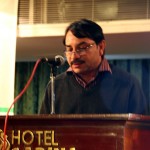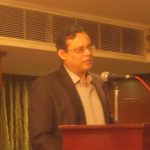Dhaka public meeting on the Internet and freedom of expression: Part 1 – #SAFoE
by Richa Kaul Padte
This blog post is eight in a series of ten blog posts to report on the 'Third South Asian Meeting on the Internet and Freedom of Expression' recently concluded in Dhaka, Bangladesh. The blog post reports specifically on the public dialogue that closed the two-day event.
Bringing together government officials, technology experts, activists, and bloggers, this public meeting was an opportunity for a panel of speakers to interact with the wider public in order to usefully move forward discussions around freedom of expression online.
The meeting was opened and chaired by Ahmed Swapan, Executive Director of VOICE (the meeting’s Bangladeshi organisers), who framed the issue by citing Article 19 as a universal right to freedom of expression, and one that has faced serious intimidations in the subcontinent. Thanking in particular the bloggers present (especially in light of the stabbing of blogger Mohiuddin the previous night), Swapan hopes that all those attending the meeting can work together for freedom of expression online.
The panel’s first speaker was Monjurul Ahsan Bulbul, Editor in Chief and CEO of the Boishakhi TV station and free-speech activist. Bulbul says: ‘under the Bangladesh government, freedom of expression is guaranteed. Freedom after expression? Who knows.’ Law implementers and influential bodies have little knowledge of new technologies, and the largest university in the country refused to implement free wifi access for its students and faculty. There is limited understanding and a lack of discussion and awareness around the technology and role of the Internet. Responding to these needs, Bulbul says, ‘whether we need new laws, no laws, or a cleaning up of existing laws, this should be done through a discussion between stakeholders, users, and different groups in society.’ Policy makers and political leaders must work closely with experts to attempt to understand the potential of the Internet, and create the best possible laws and provisions to protect its users while enabling freedom of expression.
Building on Bubul’s call for a better understanding of technology on the part of the government, telecommunications expert Abu Saeed Khanwryly cites the example of his ‘two favourite countries when it comes to freedom of expression – North Korea and Sweden’ because in the case of the former you cannot express anything, whereas in Sweden, you can say anything and everything.
Echoing the lessons of various country perspectives provided by participants over the two day conference, Khan goes on to say, ‘the effectiveness of a law pertains to the clarity of it – there must not be any grey area of understanding in-between. In our part of the world, unconstitutional forces have intervened and they have injected a great deal of grey area into the law, which has resulted in lawlessness. If a law is uncertain, it is dangerous.’
He goes on to contextualise this in reference to the laws within Bangladesh, where Section 97 of the Telecom Law allows the government to take control of a telecommunications network in a state of emergency, which is defined as ‘a situation of rebellion of disorder.’ Once again serving as a comment on the problem of vaguely worded laws, the term ‘disorder’ is subjectively interpreted, whereby the only certainty offered by the law itself is that the restoration of disorder must be ‘in the interests of the state or public order.’ Khan asks, ‘can such a loose legal framework function? No. We are sitting on a legal time bomb, and we don’t know when it is going to explode.’
Contributions from the floor in response to both Bulbul and Khan once again stress the importance of clarity around various issues. An audience member from a Bangladeshi campaign for good governance talks about the lack of awareness-raising around the laws that are implemented. She says, ‘a person like me, I don’t know about the law. But you can very easily talk with people [to explain] what the law is. What is it talking about? How can you use it? The more [that] people are conscious about the law, the more public opinion will gain ground [in influencing policy-making].’
Furthering the discussion on law making, Pranesh Prakash from the Centre for Society and Internet (India) questions the legitimacy of policies that are made without the involvement of the public. Citing the UN’s recommendations that Internet policy-making cannot be the inclusive preserve of the government and must necessarily include multiple stakeholders, Prakash asks the panel to what extent this is being followed in Bangladesh. In response, speaker Bulbul states that with Bangladesh’s RTI Act serving as an important precedent, proposed laws will now be made available on the government’s website for a period of three months for comments from the public. This will enable citizens from different sectors to participate in the law-making process and create greater transparency.
The second half of the meeting (including a speech from the Honourable Hasanul Haq Inu, Minister of Information of Bangladesh) will be discussed in the following blog post.

